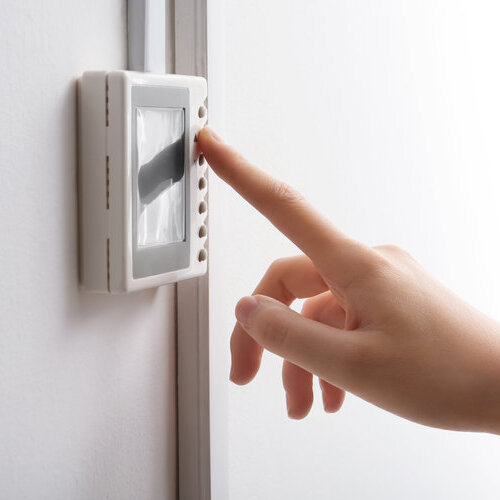
What is an electric heating system?
Summer and fall are both wonderful times here on the East Coast, drawing people from all across the country. And when the cold season arrives, we still have tourists that want to experience that Eastern seaboard winter – as long as there is a working electric heating system. Yes, the winters get chilly out this way, and there is nothing better than a roaring fireplace, snuggly blankets, and working heat.
How does an electric heating system work?
An electric heating system is often a part of an HVAC system, along with air conditioning. The electric heating is created with a heating element, an electrical resistor, and other parts. The electricity is what converts the electrical energy into heating energy with a heating element. Most today are nichrome wire and ceramic insulators.
Depending on the size of the electric heating system, it will have between three and six electric-resistance elements. Those elements have between 3 and 7 kW each, which work much the same as the elements you see inside your toaster. Inside your electric heating system are other important components:
- Contactor: This controls the voltage to the heating element by way of the thermostat
- Sequencer: This turns the heating element off and on, keeping the current spike low since it doesn’t take much to turn it on.
- Transformer: This provides power to the control circuits for the contractors, sequencer, and thermostat to work.
Which electric heating system is best?
There are several electric heating options for homes, and if your home already had an electric heating system when you purchased it, you probably didn’t give any thought to other options. However, if you’re planning to upgrade or you’re having a new home built, give this matter some thought now because cooling and heating a home creates about 17% of our carbon footprint. That is more than all the other emissions our homes create.
By choosing an electric heating system that is more efficient, you’ll save money each month and you’ll be helping the environment too. Here are the options to choose from and how they affect your budget and the environment.
Good Electric Heating System
An electric heating system may have 100% AFUE (annual fuel-utilization-efficiency) compared to a rating as low as 55% for a gas heating system. Gas does heat faster, so it runs less, and natural gas is cheaper in most places than electricity. A gas heating system can be rated by Energy Star, whereas electric heating systems aren’t. So, depending on the climate, electric heating is better for some, whereas gas is typically better in colder climates.
Better Electric Heating System
When it comes to an electric heating system, there are better choices, like electric air-source heat pumps. This will draw heat from outside – yes, even in cold weather – and transfer that heat indoors. No fuel is required and minimal electricity is needed. In fact, this type of electric heating system will use less than half that of an electric furnace system. Additionally, you’ll save on cooling with the heat pump because they work as an air conditioner too.
Another better option for an electric heating system is going with solar power. A solar heating system uses collectors that are mounted on south-facing walls. The hot air that is collected cycles with cool air inside the home and the solar thermal heat use rooftop collectors that are connected to a water tank indoors.
Best Electric Heating System
For the most efficient electric heating system, a geothermal energy system will use up to 50% less than conventional electric heating systems. A residential geothermal heating system uses a heat pump that exchanges the heat with the earth. The cost of a geothermal heating system is more expensive, but usually within three years, it has paid for itself.
Is it expensive to heat a house with electricity?
When looking at it from the outside and comparing natural gas and electric heating systems, yes, an electric heating system is more costly. Based on the raw numbers and comparing electric heating to natural gas heating systems, electric costs up to $800 annually versus the $600 for gas heating. If you’re doing a new build, note that a gas heating system will cost more to install than an electric heating system. This is often a deciding factor when build budgeting is concerned.
Electric Heating System Pros and Cons
Is your old gas furnace not heating as sufficiently as it once was, leaving you thinking about replacing it with an electric heating system? Here are some pros and cons to consider when it comes to an electric heating system:
The Pros of Electric Heating Systems
- Cheaper upfront cost. An electric heating system is more common and when it comes to installation, it is less complex. That means the technicians are done with installation faster and that leads to savings for you with less labor.
- Minimal disruption with installation. A gas furnace installation will require venting connected to the outside, but electric heating systems won’t. With that in mind, you’ll note you’re not limited to where an electric heating system has to be installed.
- Easy maintenance. Gas or electric heating systems will always need basic maintenance and routine inspections. However, an electric heating system won’t be as risky to your safety if it malfunctions.
The Cons of Electric Heating Systems
- Slow to heat. An electric heating system takes longer to power up and heat up the element to make the air warm.
- More expensive over time. Because electric power costs more than gas power, over time, an electric heating system will cost more. This is true even though it offers 100% efficiency.

All Is Well and Good – Until It Stops Working
So, you forget to schedule the annual inspection which will include cleaning and maintenance. Then you wake up in the middle of the night, and it’s cold. Your electric heating system is not working, so now what?
There are basic things you can check, like the thermostat, the circuit breaker, and even the on/off switch of the electric heating system. Even changing out the HVAC filter may be enough to get your heater going. If none of that works, you’ll need to make that phone call for electric heating system service.
Going forward, ask them about a maintenance contract so that you have less chance of these things happening. Meanwhile, if it’s time for you to call for help with your electric heating system in Hendersonville, Mills River and Asheville, NC, you can reach out to All About Plumbing & Septic at 828-778-2425.





